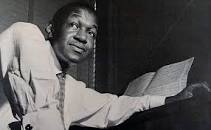Mait Eady, the host of this 1962 broadcast on WBAI, says he’s “feeling evangelical” about the interview he’s about to conduct with Herbie Nichols. I dare say that’s how virtually everyone feels once they’ve made their own discovery of Nichols, a highly original composer and pianist who recorded three albums for Blue Note yet came close to being completely overlooked during his 44-year-long life, which ended in 1963. Two things kept Nichols alive before the cognoscenti. He’s one of the four musicians profiled in A.B. Spellman’s essential 1966 book, Four Lives in the Bebop Business; and 22 of the works he recorded for Blue Note in 1955-56 were reissued in 1975 on The Third World, a two-LP set complete with an essay by the most evangelical of his devotees, Roswell Rudd, the trombonist who played in a trad jazz combo with Nichols in the early ’60s, and then arranged Nichols’ composition “Lady Sings the Blues” for the group he played in with Archie Shepp and recorded with on Shepp’s 1966 album, Live in San Francisco. (“Lady Sings the Blues,” originally titled “Serenade,” before Nichols wrote the lyric that was sung by Billie Holiday, is his only well-known tune. Holiday also named her autobiography after the song, and it was the title of the Holiday bio pic that starred Diana Ross.) In 1987, Rudd annotated Mosaic Records’ edition of The Complete Blue Note Recordings of Herbie Nichols; the 5-LP set’s booklet included poems by Nichols and the liner notes he’d written for his three original Blue Note albums. Over the years, Rudd also recorded Nichols’ music with Steve Lacy, Misha Mengelberg, Duck Baker and other collaborators. All of this contributed to a groundswell of interest in the New York-born pianist; the founding of ensembles devoted to his music (The Herbie Nichols Project); and the passionate belief that his neglect was among the most egregious in jazz history.
Nichols was born on January 3, 1919. This week, as I listened to his music, I was stunned to come upon this interview that pianist Jason Moran apparently discovered when he purchased a sheaf of Nichols’ sheet music a few years ago. Give it a good listen. I trust you’ll be moved and inspired by the substance and openness with which Herbie discusses his life and music. The interview has too many highlights to enumerate, but for now I’ll note what he has to say about drums (Nichols recorded with Max Roach, Art Blakey, and Dannie Richmond), and in particular the “perfect note” that he finds intrinsic to the bass drum. It reminded me of Whitney Balliett’s feature on Nichols for The New Yorker in which he noted that some musicians seem to choose the wrong instrument, and in Nichols’ case, he heard a musical conception that suggested Herbie may have been better suited to being a drummer. The 54-minute show opens with an excerpt from Duke Ellington’s “The Clothed Woman,” followed by two of Herbie’s records. The conversation begins @ 11:00.
